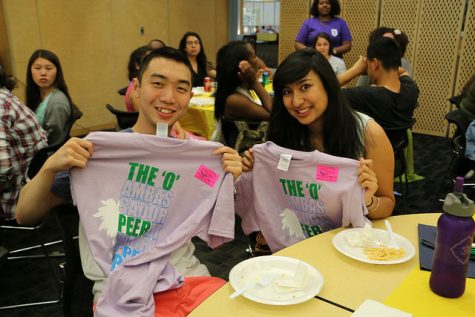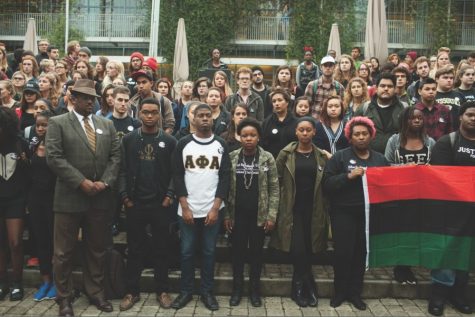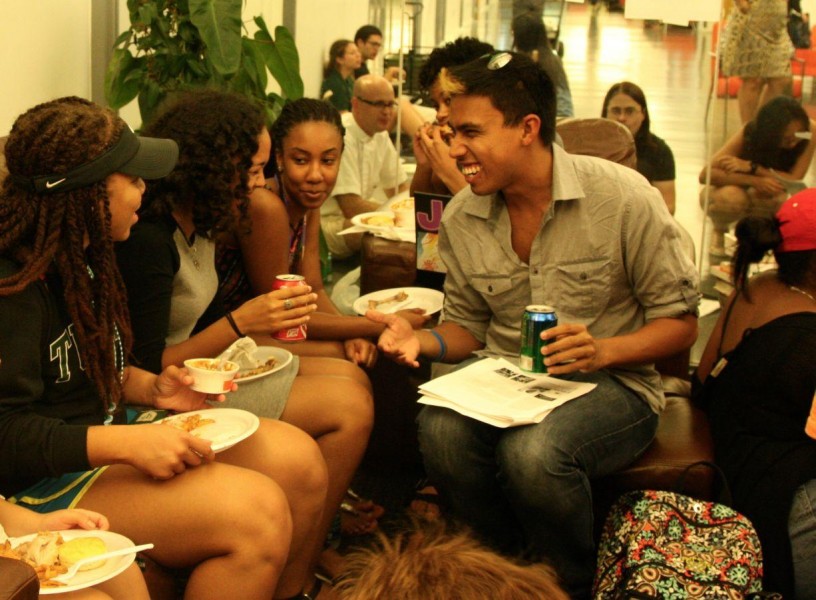“The O” provides community, opportunity to students throughout 30-year history
Courtesy of the Hullabaloo
Tulane alumni Joseph Colón eats with other program members Wednesday in the Office of Multicultural Affairs.
In honor of the 30-year anniversary of the Tulane University Office of Multicultural Affairs and Black History Month, The Tulane Hullabaloo has outlined a history of “The O” and traced its 30 years of activism, community and triumph against adversity.
If one peers between the multicolored posters and social justice-themed images covering the glass walls of G01 in the basement of the Lavin-Bernick Center for University Life, they will find a portal bridging a gap between two worlds.
More commonly referred to as “The O,” the Tulane University Office of Multicultural Affairs is a department under the Office of Student Affairs that, according to its website, “strives to promote the rich cultural resources of the Tulane community and to provide ethnic minority students with the academic, social, and personal support services that facilitate their transition to life at Tulane and in New Orleans.”
In the eyes of Carolyn Barber-Pierre, vice president of student affairs and director of the Office of Multicultural Affairs, the O also serves the greater purpose of creating a safe space for people of color and bridging the divide between marginalized students and the predominantly white Tulane community.
Students like Sydney Monix, junior and Delta Sigma Theta member, said they believe the O has in many ways transcended the idea of a safe space and instead become a second home.
“The O symbolizes not just a support system, but a family for students on campus,” junior Monix said. “The O has been the greatest factor of my undergraduate years regarding my social life and mental wellbeing. I can’t even imagine what my undergrad experience would have looked like without the O in my life.”
Humble Beginnings
Barber-Pierre said that when she first arrived at Tulane in 1983, the university was a vastly different place. Serving initially in the Office of Disability Affairs, Barber-Pierre said in the years that followed her arrival the university began to shift its focus to creating a more inclusive and diverse campus.
In light of events such as the Delta Kappa Epsilon Old South Parades, in which a group of DKE fraternity members paraded across McAlister Place in blackface, and the overall lack of representation for students of color in administrative affairs, students across campus were demanding the administration focus on issues of race and discrimination.
With the work of students, faculty and administrators like President Eamon Michael Kelly, the Office of Minority Affairs founded in 1987 was renamed the Office of Multicultural Affairs in 1988, and Barber-Pierre was appointed as its head.

Juniors Christopher Wong and Samah Ahmed are paired at the OMA Ambassador Ceremony for the mentorship program.
“We just had a lot of support, there were a lot of folks invested in these issues …,” Barber-Pierre said. “We were building a new vision for the institution. We were taking what the students wanted and trying to actualize it, and that was exciting.”
Though the office had humble beginnings with little funding and Barber-Pierre as its sole employee, she believed it was an exciting and revolutionary time to be a part of a university that was attempting to change its campus culture.
“The opportunity to create a program, an office that didn’t exist was exciting for me,” Barber-Pierre said. “Spending a lot of time talking to students, talking to other administrators about issues that mattered to students of color, at that time having the ear of the president who was really committed to issues.”
“You can go if you want, I’ll be there”
The O has served as an area for underrepresented students to connect and discuss problems they have faced within the Tulane community. During a time in which many students felt racial tension on campus, students and staff alike said they thought the space strengthened those invigorated by social justice.
Barber-Pierre said she cannot count the number of times she attended midnight meetings held by student organizers in her 30-year tenure. Before one particular 11 p.m. meeting after the DKE Old South Parade, she received a confused phone call from her supervisor to which she had one response.
“You can go if you want, I’ll be there.”
The late 1980s and 1990s were a time of great change according to Barber-Pierre. With student activism at its peak and student leaders across campus fighting against injustice, the little office in the basement of the LBC was solidifying its purpose at Tulane.
“… there was coalition-building,” Barber-Pierre said. “I mean we had Tim Wise and a number of other student leaders who realized very quickly that if they were gonna make any change on this campus that they had to come organize not only themselves, but it was gonna take the allies to make things happen.”
In recent years, Barber-Pierre said one of her proudest moments for student activists was during the 2015 Call to Unity in which the Tulane Black Student Union in conjunction with Students Organizing Against Racism drafted a list of demands derived from a similar list created by 1968 African American Congress at Tulane for the university about the state of race and racism at Tulane.

Members of the Tulane community stood on the steps outside the Lavin-Bernick Center at the Call for Unity rally in 2015.
“To me, that was the first time in a long time in which I saw that much activism, in which I saw that much collaboration. Literally in years I haven’t seen that ..,” Barber-Pierre said. “It reminded me of the ’80s and ’90s, and for the first time in a long time, students wanted to stand up for something and wanted their voices heard.”
For Alex Williams, Class of 2017 alumna and former co-convener of color of Students Organizing Against Racism, her time spent organizing events like the Call for Unity were some of her most formative experiences in college. Williams said that none of this would have been possible without the support of Barber-Pierre.
“More tangibly, as an organizer, I was grateful to have Ms. Carolyn in my corner,” Williams said. “I don’t think anyone knows the past few decades of Tulane’s history as well as she does, which helped me immensely in my desire to foster change on campus.”
Student Significance
Along with the collaborative efforts of Tulane’s administration and other key offices, many said they believe the O played a significant role in the research and advocacy for marginalized students.
From studying the recruitment and retention of African-American students to creating adjunct orientations for students and parents to network in smaller groups, the O’s commitment to the general welfare of all students spans three decades.
The O has provided opportunities for countless students – connecting them to internships, sponsoring scholarships and hosting speaker events to engage students in conversations about various topics such as race, sexuality and religion. Many students said they think these resources helped them navigate campus as people of color.
“I went to Senegal this past summer with the O, and it ended up being free through all the scholarships they provided,” Black Student Union President Will Smith said. “It’s just a lot of resources there to help you grow as a person and to help you find where you need to be and who you need to know in order to survive and thrive at Tulane.”

Aside from academic opportunities and activist platforms, the Office of Multicultural Affairs has offered a “safe space” for many students facing a community in which they might not feel a part of.
“Tulane is overwhelmingly white … and so having a space for me where I can just go and be myself is important because I feel like just existing at Tulane is a performance most of the time,” Smith said. “So just a space where you can decompress.”
For many students, the O has been more than a safe space. It has also served as a beacon of leadership, particularly with the influence of Barber-Pierre herself.
“As a black woman, seeing black women lead the O and mentor me through my college years both on and off campus has shaped me in ways I have only begun to truly appreciate in my time since graduating,” Williams said.
On the question of whether she felt the O had accomplished its primary ambition of helping students, Barber-Pierre said she felt optimistic.
“I would hope, so — I would hope that we have had impact on at least students knowing that there was a place where they could go get their concerns addressed,” Barber-Pierre said.
The O, however, has been more than a place to voice concerns. For many students, it serves as a family, one that encourages students on the path to graduation and through their experience at Tulane.
“[The O is] Home. Authenticity. Love. I feel like such a cliche, but really, the O and the people in it were there for me during some of my darkest times,” Williams said. “We laughed together, grieved together, struggled together, argued and loved each other so much at the end of the day.”
Leave a Comment
Your donation will support the student journalists of Tulane University. Your contribution will allow us to purchase equipment and cover our annual website hosting costs.




Brends Billizon • Feb 22, 2018 at 4:19 pm
I worked for Terrebonne parish property tax office in 1973 when the only other black person was pushing a broom. Yes I went thru something. But, Tulane was the most prejudice place that I have ever worked. Not just because the color of my skin but because of my Gender. I only worked in one department and it wasn’t nothing nice!!!